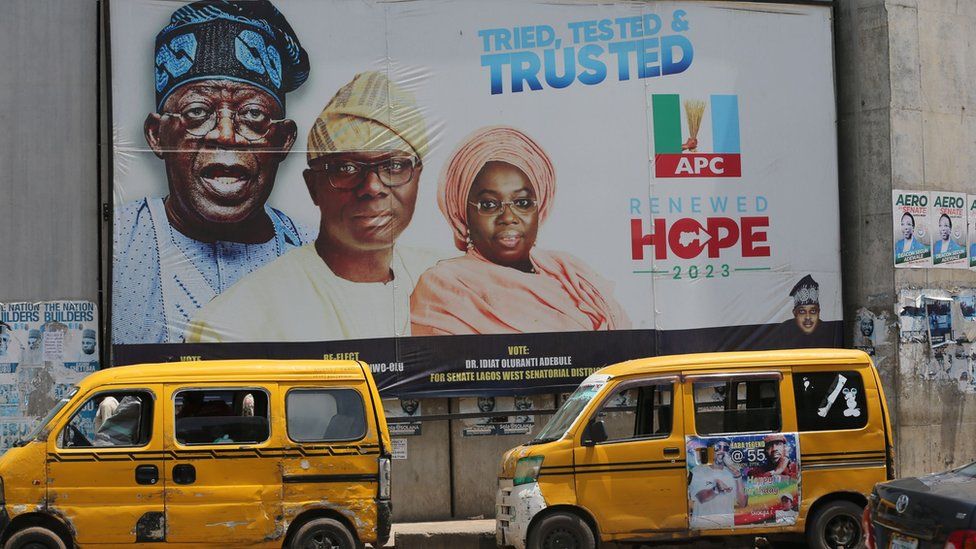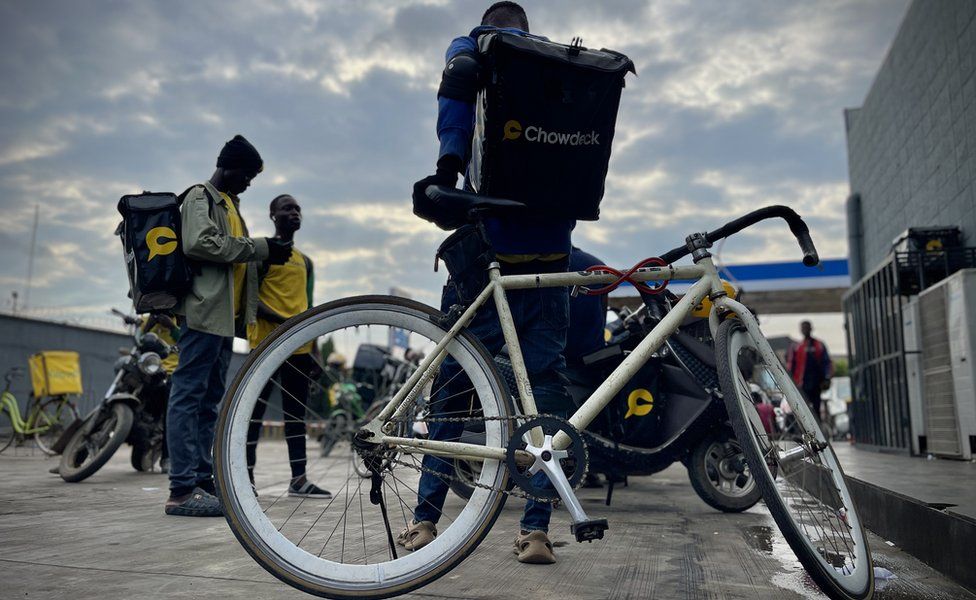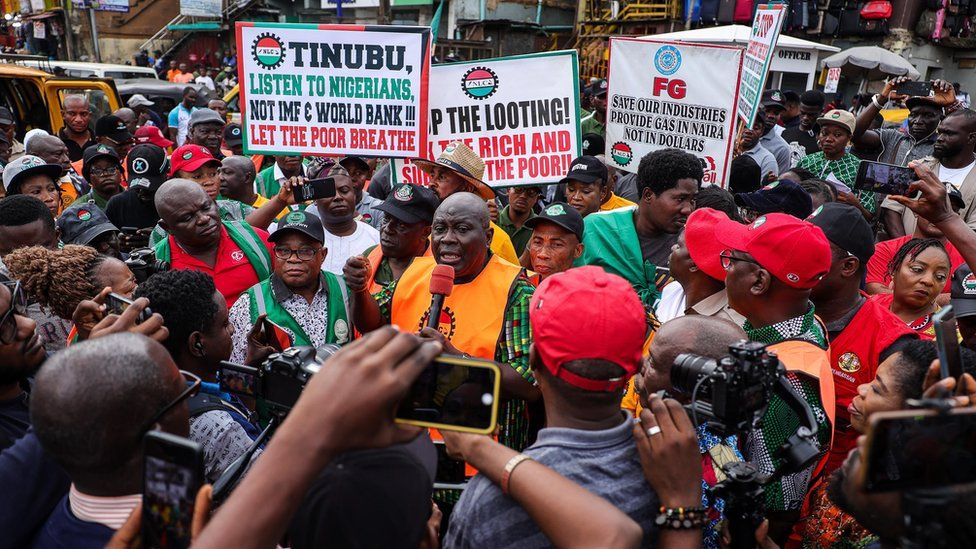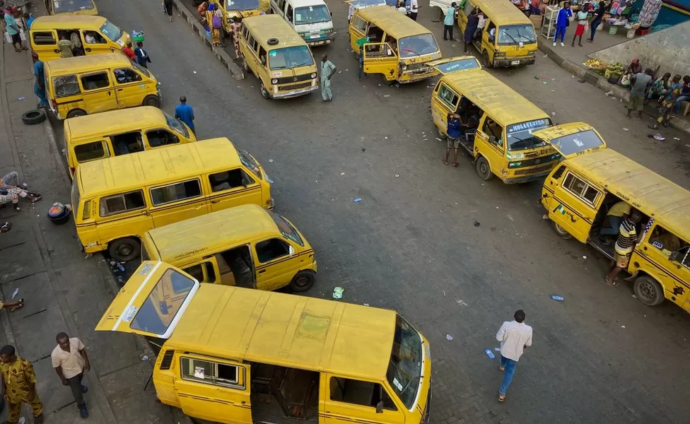Lagos feels different, the boisterous - often chaotic - energy that drives Nigeria's commercial centre has been subdued by the removal of a fuel subsidy that had kept the price of petrol low for decades in Africa's largest economy.
Since June, fuel costs have tripled, leading transport fares to shoot up and forcing many employees to return to the pandemic era by working from home.
Many private cars are off the roads. And with fewer passengers to tussle over, some of the yellow, fume-belching buses, pride of the city's eternal hustle spirit, now idle at motor parks.
The notorious miles-long traffic jams have drastically reduced.

This bustling city of an estimated 20 million people is quieter, but for once that is not a good thing.
What Lagos has gained in tranquillity it has lost economically since President Bola Tinubu abruptly ended the supply of cheap fuel in his first day in office at the end of May.
Oil-rich Nigeria, he said, could no longer afford to subsidise petrol which was costing billions of dollars a year.
Mr Tinubu also ended currency restrictions that had been put in place by the previous government, and while many experts agree that it was the right thing to do, it has led to a weakening of the local currency.
The double whammy of rising fuel costs and a weak currency has sent the economy into a tailspin, and nowhere is the biting hardship more apparent than in Lagos - a commercial behemoth that is often a snapshot of the rest of the country.
Many small businesses have packed up, and some low-income earners who live in the suburbs of the mainland and commute to the business districts on Lagos Island have stopped going to work.
"I was spending 600 naira a day on transport, it jumped to 1,000 naira. By the end of the month I was spending all my salary on transport," a cleaner said, adding that she had been forced to resign from her job.
She lives in Ikorodu, a congested part of Lagos state, which is popular with low-income earners.
Previously, the 41km (25 miles) between Ikorodu and upmarket Victoria Island took two-three hours during rush hour. Now, it can be done in 45-50 minutes.
Recent data from the National Bureau of Statistics showed that when compared to the second quarter of 2022, the contribution of road transport to the economy within the same period this year fell by around 47%.
As that data only captured one month since the policy changed, things could be even worse now.
That economic hit would have been mostly felt in Lagos, home of Nigeria's busiest port and the city that the Nigerian president prides himself on building.

"He was right to remove [the] subsidy but not at this time, not without fixing the refineries," said professor of Economics Uchechi Ogbuagu. Because Nigeria's oil refineries are not functioning, most fuel is actually imported.
"An essential commodity like energy - if you tamper with the price, there will be a multiplier effect," he said.
What to do with the expensive fuel subsidy was one of the major talking-points before elections earlier this year, with almost all economists and politicians agreeing that it had to go.
Nigeria was spending money it did not have to keep fuel prices low and it was no longer sustainable, the arguments went.
Previous investigations found that the system was riddled with corruption, and as was evident after it was stopped, a large portion of the subsidised fuel was smuggled to neighbouring countries where it was sold at higher rates.
Some experts and government agencies argued that the fuel subsidy benefited rich Nigerians more than the poor, while opponents said removing it would inflict hardship on the latter group.
But even among those who wanted the subsidy gone was an admission that it needed to be done in phases, certain things had to be put in place first.
The labour unions wanted the local refineries working, the main opposition wanted government to get out of the oil-importation market.
Others asked for subsidised transportation - especially to move farm products, and there were also questions about how the money saved would be used.
But despite having some of these in his manifesto, Mr Tinubu used an off-the-cuff remark in his first speech as president to remove the subsidy, initially sending the system into shock before prices went up.
"I was possessed with courage and I said 'subsidy is gone'," Mr Tinubu said of his now-famous remark on 29 May.
"We are tired of feeding smugglers, making few people rich and subsidising the next-door neighbour," he later said at a function in France.
With prices of petrol up, small businesses like the popular motorcycle food-delivery companies, that provided employment to young people, have had to rethink their strategies.

Some workers have been laid off while others like Happiness Emmanuel have resorted to using bicycles for deliveries, a rare sight in the scorching heat of Lagos, where there is a lack of bicycle lanes.
"I make more money and it is less expensive to maintain," he told the BBC at his food court location in the Ikeja area.
Some of his colleagues have also started using bicycles because of the high cost of fuel, he said.
Even the city's Bus Rapid Transport, which recently added electric buses to its fleet, has seen an upsurge by as much as 30%, a spokesman told the BBC.
This was helped by prices that were halved by the government, he said.
The state is also commencing operations on its metro system on Monday, and its affordable fares should get more residents on the move again.
President Tinubu announced in early August that more than 1 trillion naira ($1.3bn; £1bn) had been saved since subsidy was removed - money that otherwise would have gone to "smugglers and fraudsters", he said.
He acknowledged the hardship, asked people to "look beyond the present temporary pains," and assured that saved funds would benefit families.
Tuition loans have been introduced for poor families with children in university and talks are ongoing for the minimum wage to be raised.
The government has also distributed grains, announced plans to convert cars from fuel to gas, while some states have introduced electric buses.
For some, the current realities put an end to the arguments about who benefits from the fuel subsidy. Many want it back and now argue that fuel subsidy is not a bad if it can be ring-fenced from corruption.
"Subsidy, if implemented well, benefits all," said Prof Ogbuagu.
"Everybody was buying fuel at the same price. The poor may not have lots of TVs and fridges, but transport fares would be low," he said.

Mr Tinubu has assured that there are no further plans for petrol prices to rise - which ought to happen as the naira weakened further - all but signalling that the subsidy was back.
He has also announced his cabinet, filling up important posts that are crucial in driving the economy.
It demonstrates how difficult it is to do away with what is a popular policy, even for President Tinubu who has often boasted of having the will to carry out difficult decisions.
He will not be the first Nigerian president to walk back on the scrapping of the fuel subsidy, though predecessors faced far stiffer opposition, such as nationwide protests in 2012.
There have been pockets of protests in some states against the hardship and the labour unions staged lacklustre demonstrations but they barely registered.
Such demonstrations have often kicked off in Lagos in the past, with other parts of Nigeria feeding off its energy to join in.
But for once, the city that never sleeps is low on fumes, literally and metaphorically.
Latest Stories
-
FIFA Club World Cup 2025: Sundowns, Esperance join Al Ahly and Wydad as CAF representatives
2 hours -
CAFCL: Al Ahly set up historic final with ES Tunis
3 hours -
We didn’t sneak out 10 BVDs; they were auctioned as obsolete equipment – EC
6 hours -
King Charles to resume public duties after progress in cancer treatment
7 hours -
Arda Guler scores on first start in La Liga as Madrid beat Real Sociedad
7 hours -
Fatawu Issahaku’s Leicester City secures Premier League promotion after Leeds defeat
7 hours -
Anticipation builds as Junior Speller hosts nationwide auditions
8 hours -
Etse Sikanku: The driver’s mate conundrum
8 hours -
IMF Deputy Chief worried large chunk of Eurobonds is used to service debt
9 hours -
Otumfuo Osei Tutu II celebrates 25 years of peaceful rule on golden stool
9 hours -
We have enough funds to pay accruing benefits; we’ve never missed pension payments since 1991 – SSNIT
9 hours -
Let’s embrace shared vision and propel National Banking College – First Deputy Governor
10 hours -
Liverpool agree compensation deal with Feyenoord for Slot
10 hours -
Ejisu by-election: There’s no evidence of NPP engaging in vote-buying – Ahiagbah
10 hours -
Ejisu by-election: Independent ex-NPP MP’s campaign team warns party against dubious tactics
10 hours

